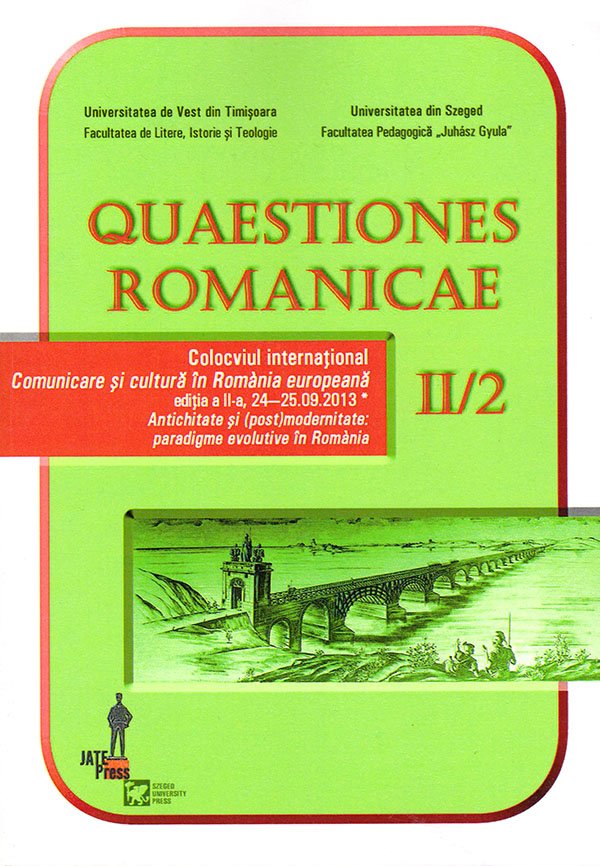Macedonski „Momentul” – placă turnată în poetica românească
Abstract: (Macedonski “moment”– turn table in Romanian poetics) As the title emphasizes, in this work we intend to make evident the fact that Macedonski rises above, by his poetic creation, his own theoretical ideas concerning the poetics. At the level of poetic language the Macedonski “moment” represents, after Eminescu, the first real breach in the system of stylistic practices of tradition. By Macedonski’s creation there were crystallized in the Romanian literature after 1880 another type of poetic conscience and a new type of poeticity that the modernity will more and more powerfully continue. With the gradual abandonment of the old types, a new type of poeticity appears in the French literature that penetrates, also, in our culture. Treated at the beginning with hostility and irony, this new poetics marks by Macedonski’s creation the first and deepest breach in the tradition, after Eminescu’s poetic revolution. Appeared in the Romanian literature in the full ascension of Eminescu’s poetic, Macedonski marks the beginning of the Romanian poetic modernity by the modern need of meditation on the poetic act, the essential question being what the poetry is? Macedonski – a real “turn table” of Romanian poetics – denies the discursivity and the rhetorisme and comes near to the synesthetic perception, replacing the classic image based on the spatial representation by “the impression”, intuiting the refrain effects, etc. In Macedonski’s conception, the poet’s song is the real poem, the “sacred fire” that a lot of poets are looking for, but there is only a few of them that don’t burn their wings trying to attain until it.
Keywords: Macedonski, poetic art, poeticity, synesthesia, stylistics.
Rezumat: Aşa cum subliniază şi titlul, în această lucrare ne propunem să evidenţiem faptul că Macedonski îşi depăşeşte, prin creaţia sa poetică, propriile idei teoretice asupra poeticului. În planul limbajului poetic „momentul” Macedonski reprezintă, după Eminescu, prima breşă reală în sistemul practicilor stilistice ale tradiţiei. Prin opera lui Macedonski s-a cristalizat în literatura română de după 1880 un alt tip de conştiinţă poetică şi un nou tip de poeticitate pe care modernitatea le va continua din ce în ce mai puternic. Odată cu renunţarea treptată la vechile tipare, îşi face apariţia în literatura franceză un nou tip de poeticitate care pătrunde şi în cultura noastră. Privită la început cu ostilitate şi ironie, această nouă poetică marchează prin opera lui Macedonski prima şi cea mai adâncă ruptură faţă de tradiţie, după revoluţia poetică eminesciană. Apărut în literatura română în plină ascensiune a eminescianismului, Macedonski marchează începutul modernităţii poetice româneşti prin nevoia modernă de a medita asupra actului poetic, întrebarea esenţială fiind ce este poezia? Macedonski – o adevărată „placă turnantă” a poeticii româneşti – neagă discursivitatea şi retorismul şi se apropie de percepţia sinestezică, înlocuind tabloul clasic bazat pe reprezentare spaţială cu „impresia”, intuind efectele refrenelor etc. În concepţia lui Macedonski, cântecul poetului este adevărata poezie, „focul sacru” pe care mulţi poeţi îl caută, dar puţini sunt cei ce nu îşi ard aripile încercând să ajungă până la el.
Cuvinte-cheie: Macedonski, artă poetică, poeticitate, sinestezie, stilistică.
